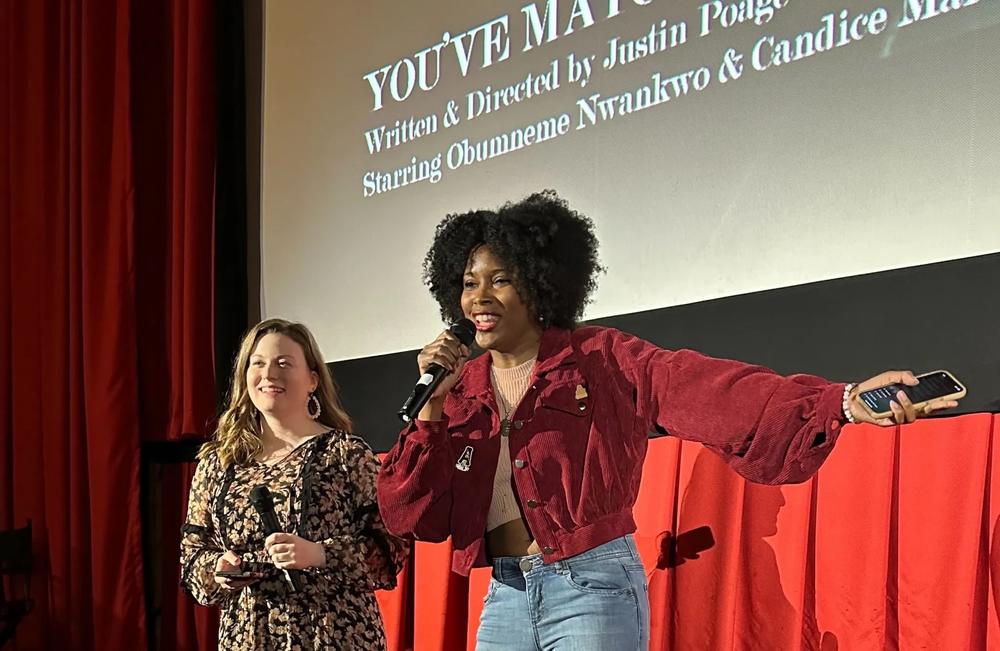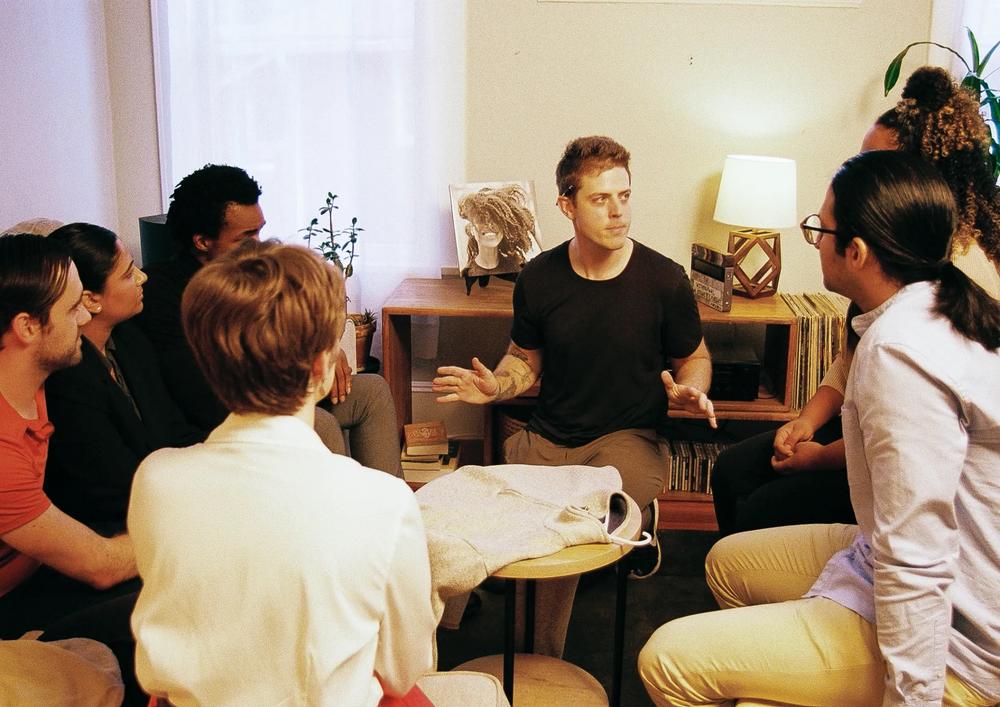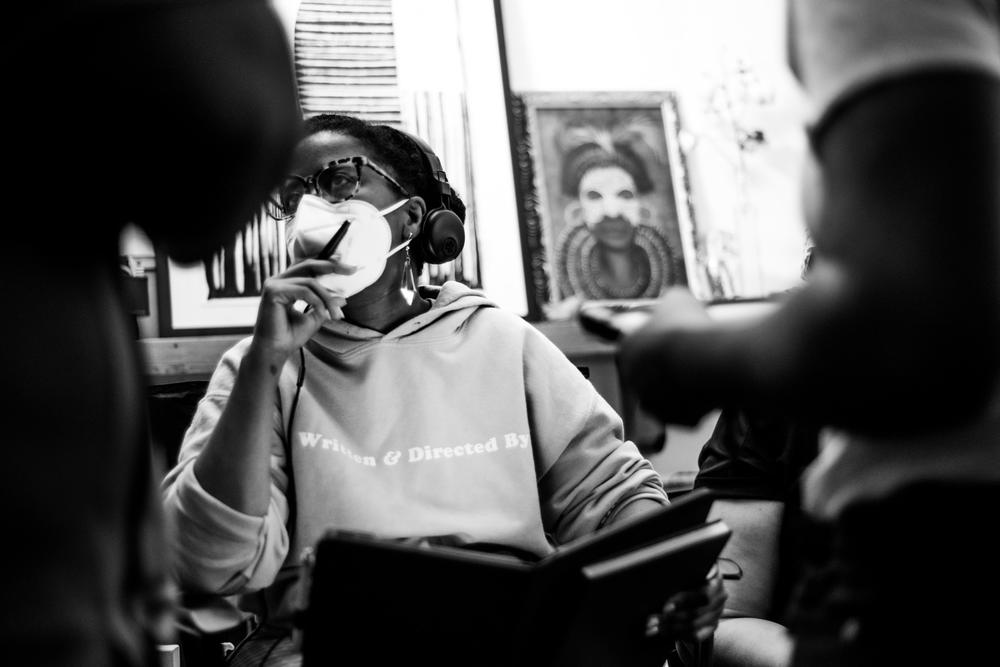
Caption
Astin Rocks (right) at Atlanta Film Society presents LOCALS ONLY.
Credit: Keith Hannigan / Atlanta Film Society

Astin Rocks (right) at Atlanta Film Society presents LOCALS ONLY.
Astin Rocks left Atlanta dreaming of being in the film industry. By the time she was a senior at Temple University, the production that now permeates Georgia’s landscape had already begun to flourish.
When Rocks moved back to Atlanta in 2017, she returned not just to the likes of the Marvel Cinematic Universe and the robust, commercial film industry that saturates the Georgia market, but a swiftly expanding independent scene as well. Young aspiring filmmakers were meeting on the sets of larger productions and recruiting each other to work on their own projects, forming a community in real time. As the years went by, organizations like ATLFilmParty and audio_video_club began to crop up, giving those filmmakers a platform to share the work they created.
“I think there was a community here,” Rocks said. “But making sure that there are places we could celebrate — and more than one, you know what I mean? — I think is the biggest difference.”
The Atlanta indie scene has continued to grow, and certainly there are more opportunities for filmmakers trying to make it than there were a decade ago. But some local filmmakers still feel they are not taken as seriously or given the same consideration as their counterparts in Los Angeles or New York, and — despite a booming commercial industry — the financial strain of making movies is taking its toll.
“A lot of Atlanta filmmakers or Atlanta people who have been here are getting pushed out,” Rocks said. “We are trying to figure out how to survive huge rent surges while also save for the film that we’ve been trying to make for a while. Because filmmaking is expensive.”
Since the Georgia General Assembly passed the state’s film tax credit in 2008, film and television productions have flocked to the Peach State. The tax incentive allows for a production that spends $500,000 to receive tax credits for up to 30% of the cost of that production. Different sources put the typical budget for an independent feature film at different levels — anywhere from less than $2 million, to $2.5 million, to anywhere under $30 million, which is the budget cap to qualify for the Independent Spirit Awards. However, many indie filmmakers making shorts or features are making them for far below the $500,000 price tag that warrants the tax credit.
The $500,000 threshold can be met with multiple projects produced by the same company in a single tax year, but the work of attempting to achieve that would still put a tremendous strain on small creatives.
Aaron Strand, a local actor and filmmaker, said he would like to see the barrier for entry for the tax incentive lowered, or at least structured in a way that could lend some benefit to local emerging talent. Strand said he shot his first feature film last year for $40,000. For a movie, that might not seem like a ton of money. But for an individual trying to make a living, it’s a massive amount.
“I don’t need the full [30%] tax rebate,” Strand said. “But if I could have gotten a 15% rebate on my $40K, that I invested all in local talent, that would have been massive.”

Aaron Strand directing actors on the set of upcoming feature film “Withdrawal.”
In a recent interview with Rough Draft Atlanta, Georgia House Rep. Long Tran, a member of Georgia’s Arts and Entertainment Committee, said he would like to see the threshold for the tax incentive lowered in the future. However, Craig Miller, the chair of Government Relations for Georgia Production Partnership (GPP), the first organization to lobby for film tax credit in Georgia, said the tax incentive is set up to attract large-scale productions because those are the projects that bring spending to the state.
Miller said he thinks in the future, smaller communities and cities outside of Atlanta might begin to set up smaller incentives of their own to attract productions. There are some programs like this already in existence, such as the Columbus Film Fund, which provides compensation for things like housing and transportation costs associated with bringing crews to Columbus.
“The GPP is definitely in support of independent producers,” Miller said. “But to make it go any lower than $500,000 really puts a crunch on everybody on the back end to try to make that work, and I don’t see that to be a change that we would push in the future.”
Funding is a huge obstacle for small local filmmakers. The filmmakers who spoke with Rough Draft Atlanta said many projects are self or crowdfunded, with many filmmakers using the money they get from working on larger projects to fund their personal work. If you’re not crowdfunding or paying for the film yourself, grants or fellowships are some other options. There are some opportunities like this in place in Georgia from organizations such as Film Impact Georgia, or the Atlanta Film Society and the Trillith Institute, which both have residency programs for filmmakers. For the winner of its Feature Screenplay competition, the Atlanta Film Festival offers access to its Atlanta Film Festival Screenwriters Retreat. The Georgia Film Office has a list of grants on its website, including opportunities both in and out of the state.
But many fellowships, grants, or residency programs that are not specific to Georgia might require filmmakers to leave the state for a certain amount of time if they were to win. Filmmaker Ebony Blanding, who recently became the Trillith Institute’s first Emerging Creative in Residence, said many of the Atlanta filmmakers she knows won’t apply to fellowships or grants outside of the state because they don’t have the financial means to be able to go.
“A lot of us don’t apply to those things,” she said. “If we do apply, it feels like if you get any, you have to beg, rob and steal just to make it happen.”

Ebony Blanding on the set of her short film “Jordan.”
The sense that there still aren’t as many opportunities for emerging filmmakers in Georgia as there are in places like Los Angeles leads to a feeling that even with all of the film production happening in their backyards, creatives have to leave to make any sort of progress in their careers, Blanding said.
“I’m always wanting folks to stay here — like, come on, y’all! Let’s rough it out,” she said. “It’s really hard to convince people to stay if they can’t see the other side of it yet.”
When speaking to filmmakers who live and work in Georgia, you can feel the connection between them and get the sense that there is a real, tight knit community working here. That’s what drew filmmaker Brian Lonano, who visited Atlanta in 2007 and then moved here from New York in 2012.
“I visited Atlanta and noticed that there was this small town sense of community within film,” he said. “Everybody was directing something, but they were also helping out on each other’s projects. And I liked that, I really liked that.”
Lonano said that he feels the larger industry here is still heavily reliant on showrunners and creators based out of LA and New York. Many filmmakers voiced the opinion that Georgia is primarily used as a place where productions can stock up on crew members or extras instead of truly investing in the artistic work being done locally.
“When they’re coming out here to make their productions, they’re already set,” Lonano said. “They’re like, we got our directors, we got our writers, we got our editors, and they’re all in LA, or close by to LA. And we’re not going to think about local DPs or local editors and stuff like that. They’ll find local assistant editors, and they’ll find locals to do the camera operating.”
Filmmaker Connor Christensen sang the praises of organizations like Film Impact Georgia for the work they do giving out grants, but did say that he has plans to move to Los Angeles. He said he thinks something that might help elevate Atlanta is for local filmmakers who have the means to shoot for those bigger opportunities in other places to do so, and then come back and help fortify the film community here.
“I just feel that we don’t have the network set up, I would say, as far as funding, agents and managers — that all still feels very outside of Atlanta,” Christensen said. “I feel like we could be building towards that, but I really don’t see it here now. I haven’t seen it in the past 10 years I’ve been doing this. It still feels like all the money and all the ideas for bigger films and projects come from those major markets.”
While locals might make up a lot of Atlanta production crews and take up room as extras, above the line positions are a different story. Above the line positions include department heads, principal cast, directors, screenwriters and producers. Jenna Kanell — known for her acting roles in horror films like Terrifier and The Bye Bye Man, but also a filmmaker in her own right — said that while she’s seeing more opportunities above the line become available for Atlanta creatives, there’s still a stopping point.
“There’s still kind of a glass ceiling here, where we are still struggling to push in terms of local hires above the line, as we say, like in department heads positions,” Kanell said.

Jenna Kanell on the set of the 2023 horror film “The Buildout.”
So, how do Atlanta creatives prove they are worthy of above the line positions? One way is doing what they’ve always done — keep grinding, networking, and proving to industry higher-ups that they are worth the risk, said Kanell. “Use that material to prove to gatekeepers that there is a talent pool here, and we’re worth paying attention to,” she said.
But Kanell also added that change doesn’t just happen from the bottom up. There will have to be a change from the top down as well.
“There are a ton of talented, amazing, incredible people in Los Angeles,” Kanell said. “But I think a lot of gatekeepers look down on Atlanta, because it’s so recently become huge. Which is really funny to me, because movies period are a very, very young industry. And so all of us, really, are relatively new to this.”
Blanding agreed, saying that more investment in above the line talent in Georgia is important to changing the perception of the industry in Georgia as a whole.
“Until we change that, then it’s going to always be some of the power players coming here and thinking that they’re doing us a favor by playing in our backyard,” she said.
However, some filmmakers were more skeptical if it’s even possible to change the way Hollywood views those outside of its purview. Aaron Strand said it was hard for him to see Georgia making its way away from the service model of the film and television industry.
“I don’t think we’re ever going to work by playing their game. Hollywood is never going to open their doors to Atlanta-based filmmakers, because what’s in it for them?,” he said. “Obviously, they’ll look to monetize and capitalize on anybody they think can turn a buck, but they’re never going to be like, let’s help this market 2,000 miles away get their own decision making power.”
Strand said that he believes if the tax incentive were to ever go away, the film industry would go with it.
“They are here for the money,” he said. “They are not here because they love Georgia.”
But so many of the filmmakers who live here do. Georgia is often asked to stand in for other places in films, but, from the diversity of its residents to the diversity of its landscape, it has a unique energy, culture, and history all its own. Blanding said it best — “What makes Georgia and places outside of LA and New York wonderful is that they’re not LA and New York!”
“I’m excited to be able to scale my journey and stay here in Atlanta,” she said. “I think this is a crucial part of who I am as a person. And so it just cultivates my art more, being able to have home and family and community pour into me in ways I don’t think I would be afforded if I packed up and moved back to California.”
This story comes to GPB through a reporting partnership with Rough Draft Atlanta.